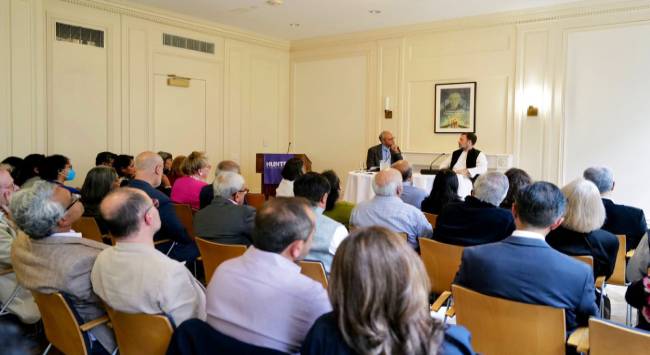Summary
While Congress leader Rahul Gandhi’s criticism of Prime Minister Narendra Modi’s government has triggered a sharp controversy, his less-noticed remarks on India’s international relations suggest an enduring domestic consensus on foreign policy, especially on its relations with China, Russia and the United States.
Despite the sharp polarisation in the Indian polity today, there appears to be a broad agreement on the nation’s international relations. During his visit to the United States (US) for 10 days from 31 May 2023, Congress leader Rahul Gandhi mounted significant attacks on Prime Minister Narendra Modi’s economic policies and accused him of undermining India’s democratic institutions. Yet, he also supported the Bharatiya Janata Party (BJP) government’s foreign policy for the first time in an explicit manner. For one, the Congress party appears to have decided to match the BJP’s effort to mobilise the diaspora for political gain at home. Although the Congress might not have the organisational coherence and purposefulness of the BJP, it may have an opportunity to tap the anti-Modi and anti-Hindutva sentiments in the diaspora.
In fact, the Congress has a much older tradition of engaging the diaspora. During the independence movement, the Congress had actively sought to mobilise the diaspora as well as work for the interests of the diaspora. There is no better example than Mahatma Gandhi, who fought for the rights of the Indian diaspora in South Africa. More broadly, the Congress sought to rally the diaspora to fight for Indian freedom from British colonial rule. After independence, as the Congress became the ruling party for decades and its organisation became dysfunctional, its ability to mobilise the diaspora steadily diminished.
Gandhi’s decision to reconnect with the diaspora is in part about emulating Modi, who has taken the engagement with the diaspora to a whole new level. The outreach to the diaspora is now becoming an important bipartisan feature of India’s international relations. Many regional parties too seek to leverage their particular ethnic and linguistic diasporas around the world.
Far more consequential is the emerging consensus on India’s great power relations amidst the extraordinary turbulence in the ties between US, Russia and China. The West today is at war with Russia over Ukraine. The US is also mobilising the West to counter China’s ambition to dominate Asia. Meanwhile, Russia and China have announced an ‘alliance without limits’ between themselves.
Given the considerable unease in the US and Europe on India’s reluctance to criticise Russia’s invasion of Ukraine, it was inevitable that Gandhi was asked about his party’s views on the Russia-Ukraine war. Gandhi referred to India’s past relationship with Russia and “certain dependencies”. He said a Congress government “would have a very similar stance” to that of the BJP. “At the end of the day”, Gandhi added, “we have to also look out for our national interest.”
Far more significant has been the evolution of the Congress’ views on China and the US. Commenting on China, Gandhi repeated his well-known criticism of the Modi government’s presumed failure to cope with Chinese aggression in the Ladakh region. The Congress has traditionally tended to take a benign view of China thanks to its commitment to the ideologies of non-alignment and Asian solidarity. Gandhi’s attack on Modi’s China policy from the right underlines how far the Indian pendulum has swung against China. The series of military crises on the border in 2013, 2014, 2017 and 2020 has led to deep disenchantment across the political class. China’s relentless pressures on India in the Subcontinent and the Indian Ocean and Beijing’s opposition to New Delhi’s global aspirations have little room for Indian sentimentalism toward China.
Gandhi’s remarks on India’s bilateral relations with the US have also hewn close to the historic positive shift in India-US relations that has occurred under the Modi government. During the decade-long United Progressive Alliance (UPA) rule, the Congress-led coalition was deeply divided on closer ties with the US. Prime Minister Manmohan Singh opened the doors for a dramatic transformation in the relations with the US through the historic civil nuclear initiative and a 10-year framework for defence cooperation in the summer of 2005. But there was much handwringing in the Congress leadership about getting too close to the US and abandoning the traditional policy of non-alignment.
If the pressure from the left parties of the UPA coalition nearly wrecked the nuclear deal with the US in the first term of the UPA (2004-09), the Congress deliberately slowed down the strategic engagement with the US during the second term (2009-14). The government seemed to encourage a return to the idea of non-alignment between the US and China.
In the nine years since Modi took charge, the Congress seemed reluctant to endorse deeper ties with the US being pursued by Modi. During his visit to the US though, during which Gandhi reported to have met some officials in the White House, he was very supportive of the relationship. A key adviser of Gandhi was quoted as saying that Gandhi “is a strong believer in the deepening and what he calls broadening of India’s India-US relationship. And he believes that it is absolutely necessary to take on the rise of China”. The adviser cites this as one of the key messages from Gandhi’s US visit.
Historically, Delhi’s external relations benefited from a substantive domestic consensus. The current domestic political divisions do not seem to threaten that positive tradition. Gandhi’s comments on foreign policy during his visit to the US then augur well for India’s ability to cope with the unfolding shift in great power relations.
. . . . .
Professor C Raja Mohan is a Visiting Research Professor at the Institute of South Asian Studies (ISAS), an autonomous research institute in the National University of Singapore (NUS). He can be contacted at crmohan@nus.edu.sg. The author bears full responsibility for the facts cited and opinions expressed in this paper.
Image source: https://twitter.com/RahulGandhi/status/1665192094128828416/photo/1
-
 More From :
More From :
-
 Tags :
Tags :
-
 Download PDF
Download PDF


